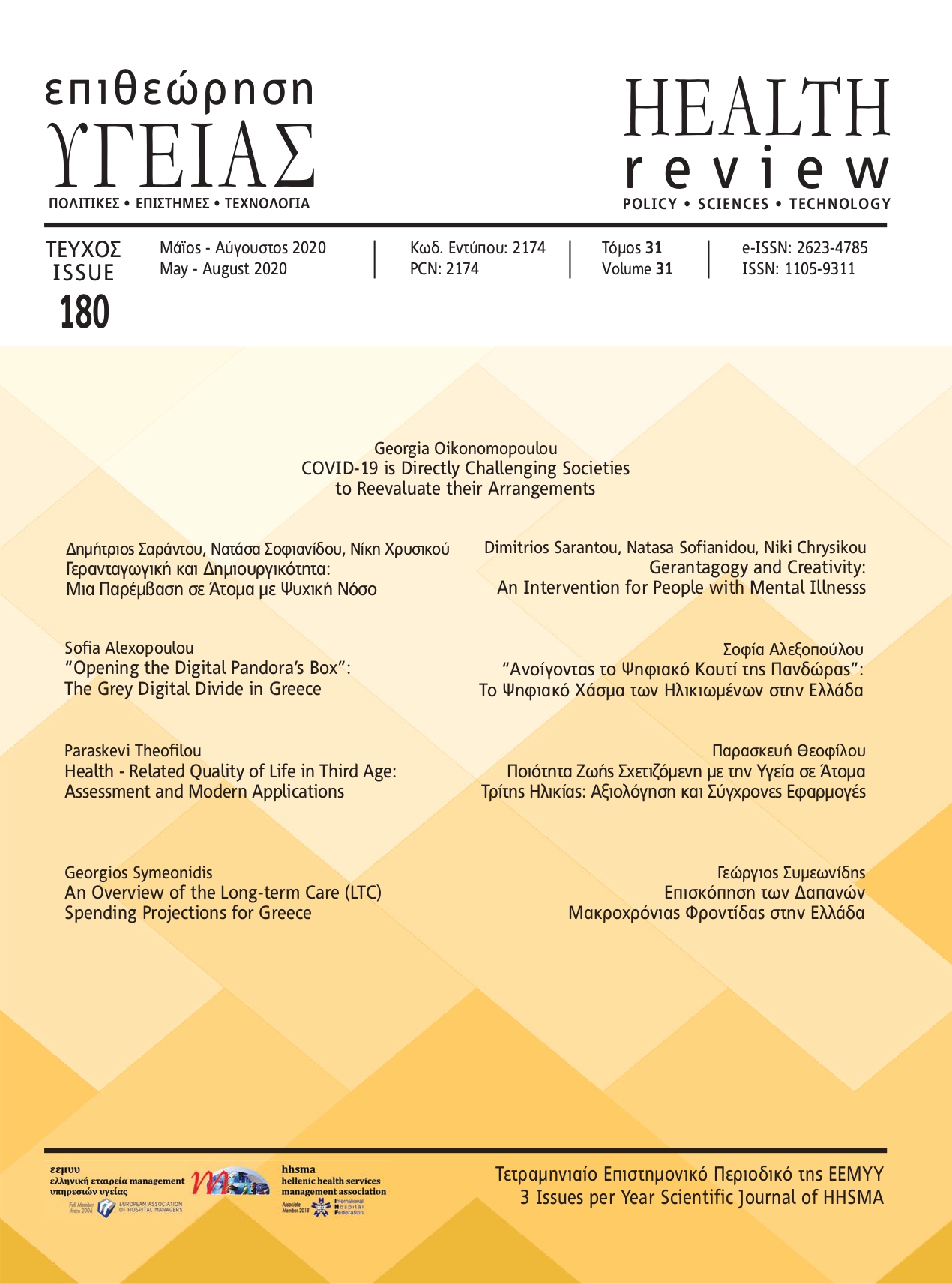
3 Issues per Year Scientific Journal of HHSMA
Editor in Chief: Georgia Oikonomopoulou MSc, PhD(c), Board Member of HHSMA, Board Member of EAHM
Latest Published Articles
Mental health is an important part of each human entity and requires constant monitoring and care. Equally important is creativity, as a source of prosperity and a springboard for activating one's mental and emotional functioning. How does third age and mental health relate to creativity? We investigate the effects of creativity on the maintenance and regaining of cognitive and emotional functions and the dynamics of relationships through six different forms of art. The action is based on the implementation of a program of intervention in a Psychosocial Rehabilitation Unit (Home) for elderly people with mental health problems, which examines the possibility of developing creativity. With arts as the main core, we draw on elements of art therapy, drama therapy, and psychodrama, which have been adapted to elderly needs and possibilities. Recognizing that Gerantagogy aims at the continuous learning of elderly, there is a need to examine its connection with Neuroaesthetics field.
Older adults constitute a viable resource in some countries of the European Union (EU), which is not found in the social margin that predominantly occurs in Greece. These countries have realized that the usage of digital technologies (Information and Communications Technology/ICT’s and the Internet) is an important tool for activating older adults, reducing their loneliness and a first-class opportunity for improving their daily life, e.g. through the use of telemedicine. By contrast, in Greece, which is defined by a rapidly ageing population, the discussion on the “grey digital divide” (the lack of access/usage of digital technologies) in relation to older individuals remains a problem that has not yet been sufficiently explored, while the formal policy is still at an embryonic stage with significant consequences for the entire Greek society. To conclude, the digital divide in Greece is a multi-dimensional matter that reflects the chronic pathogenies of the Greek state and a lack of political imagination to change the current situation.
Introduction: In recent years there has been a growing interest in the investigation of the quality of life (QOL) in elderly patients. Purpose: The examination of the psychometric properties of the Greek version of the Missoula-Vitas Quality of Life Index-15 (MVQOLI) questionnaire, the shortest form of the MVQOLI-25, as well as the Illness Effects Questionnaire (IEQ) in a sample of elderly patients. Material and method: The Greek version includes the 15 questions of the English prototype, while the study of the questionnaire was based on a sample of 79 elderly subjects consisting of patients with chronic renal failure of end stage who were attending a dialysis program (HD). The questionnaire consists of five dimensions (symptoms, functionality, interpersonal relationships, wellbeing, spirituality) and the overall score. The statistical analyses carried out relate to the measurement of internal validity, repeatability, the agreement of the replies (test, re-test reliability), as well as the convergent validity with the statistical programme Statistical Package for Social Sciences (SPSS), version 23.0. The IEQ questionnaire also examined the reliability and validity of different groups of elderly chronic patients. Results: The internal validity of the MVQOLI-15 was satisfactory, with the total score of Cronbach's alpha being 0.74. Regarding the convergent validity, significant correlations were identified between the overall score and the five dimensions. The test, re-test reliability (Pearson’s r και ICC values) was excellent, with values ranging from 0,91 to 0,98. In a general population of elderly patients, IEQ had excellent short-term R = 0.99 measurements while in a population of elderly people with spinal injuries, the two-day reliability coefficient was R = 0.95. IEQ developed relatively strong relationships with Illness Behavior Questionnaire in a population of 121 elderly patients with chronic pain and arthritis. Conclusions: The above questionnaires are reliable and valid tools to assess the QOL.
Age-related spending has spawned great interest in Academia and policy-makers alike as the demographic effect leaves no space for additional fiscal burden. The European Commission, under the Aging Working Group, has been monitoring age-related spending for a few decades and provides insight and results of each Member State and the European and Euro-area averages. The five components of age-related spending, namely Pensions, Health, Long-term care, Unemployment and Education, are not of the same fiscal weight. Pensions and Health have already been in the limelight for quite a long time now, however the long-term care is slowly but surely becoming a point of interest because of Aging. People live longer and better and this means – among other things – they will need additional help to cope with disease which was previously terminal, but can now be treated. Respectively, for age-related incidents which tend to become more acute as people reach the expected life limit or – hopefully – exceed it. This paper aims to analyze the data for long-term care as reported to the Aging Working Group in the last four projection rounds, compare and contrast them and provide reasons for the important inconsistencies spotted in the former. As long-term care in Greece has shifted partly from the Local government to the General government and vice versa, proper data reporting and collection has not yet been up to international standards.
As the new decade began everything rapidly unfolded into a scenario that the world will remember for years to come. We are experiencing an unimaginable global viral pandemic of zoonotic origin that policy, investments and our collective imaginations over the coming years will be overshadowed by a virus that took fewer than 100 days to shut the world down. The outbreak was first identified in Wuhan, China, in December 2019. On February 11, 2020, the World Health Organization (WHO) announced an official name for the novel coronavirus SARS-CoV-2 disease COVID-19 (coronavirus disease 2019).On March 11, WHO has declared the novel coronavirus outbreak a global pandemic.
